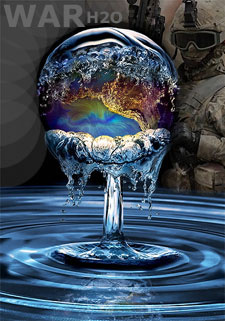 WAR H2O: Experts warn of water shortages by 2080
WAR H2O: Experts warn of water shortages by 2080
Will Canada will be the Next Iraq?
by Frank Wilson
Forget Islamic Terror Wars. That’s going to be non-cents in the coming decades. As soon as oil is replaced by alternative energies, say around 2020, we will have a brand new resource war to fight. This war will make the 100 Years War for Oil look like a bar room brawl at you local beer hall. This one really will be over life and death and death to millions probably billions will be its’ result.
It’s truly scary and will have consequences for all humans, yes that includes the red and blue folk and those islamos who currently occupy some peoples black list. Yes, we will all be in this war together. So get ready for our leaders to declare that Canada has WMD’s in a George Bushian ruse to take their water! Sorry Canada, you have more water than everyone else and so that puts you on the list as the next Iraq.
Consider that half the world’s population could face a shortage of clean water by 2080 because of climate change, experts warned Tuesday. This reality will hit all of our children and their children collectively and cause a world war to end all wars. Ths is truly scary!
Wong Poh Poh, a professor at the National University of Singapore, told a regional conference that global warming was disrupting water flow patterns and increasing the severity of floods, droughts and storms — all of which reduce the availability of drinking water. Wong said the U.N. Intergovernmental Panel on Climate Change found that as many as 2 billion people won’t have sufficient access to clean water by 2050. That figure is expected to rise to 3.2 billion by 2080 — nearly tripling the number who now do without it.
Reduced access to clean water — which refers to water that can be used for drinking, bathing or cooking — forces many villagers in poor countries to walk miles to reach supplies. Others, including those living in urban shanties, suffer from diseases caused by drinking from unclean sources.
At the beginning of the decade, the World Health Organization estimated that 1.1 billion people did not have sufficient access to clean water.
Most vulnerable region: Asia
Asia, home to more than 4 billion people, is the most vulnerable region, especially India and China, where booming populations have placed tremendous stress on water sources, said Wong, a member of the U.N. panel.
"In Asia, water distribution is uneven and large areas are under water stress. Climate change is going to exacerbate this scarcity," he told the two-day Asia Pacific Regional Water Conference attended by policy makers, government officials, academics, businessmen and consumer group representatives.
Scientists have said global climate change takes many forms, causing droughts in some areas while increasing flooding and the severity of cyclones in others. Droughts reduce water supply, and floods destroy the quality of water. Rising sea levels, for instance, increase the salt content at the mouths of many rivers, from which many Asians draw their drinking water.
"As human civilization develops, the environment is increasingly affected in negative ways. Floods, drought, changing rainfall patterns and rising temperatures are signs of our misdeeds to nature," said Rozali Ismail, head of a state water association in Malaysia.
Calls to embrace Kyoto Protocol
Wong and others at the conference called on governments to embrace the Kyoto Protocol climate treaty to fight global warming and protect water resources, as a short-term solution.
But eventually governments must build infrastructure to protect coastal areas, improve management of water basins and adopt new technologies to enhance availability and reliability of water resources, Wong said.
The United Nations is currently campaigning to replace the 1997 Kyoto Protocol — which regulates the emissions of 37 industrial countries — with another accord at a meeting in Copenhagen in December 2009.
The Kyoto Protocol was signed by 183 nations in 1997. But the United States — long the world’s biggest emitter, though it is now rivaled by China — rejected the plan over concerns it would harm the American economy.
Developing countries such as China and India also refused to accept a binding arrangement that they said would limit their development.
In the end, its highly unlikely that our human poplulations can sustain a balance. We won’t be able to control and keep a sustainable water supply. Humans will consume themselves into scarcity. Wars will break out, regionally at first then they will go global. Millions will die as fights break out to compete for water. The worlds population will be forced to shrink in recession to find it’s equilibrium. Our U.S. Military will be fighting wars for water! Does it ever end?
ATTENTION READERS
We See The World From All Sides and Want YOU To Be Fully InformedIn fact, intentional disinformation is a disgraceful scourge in media today. So to assuage any possible errant incorrect information posted herein, we strongly encourage you to seek corroboration from other non-VT sources before forming an educated opinion.
About VT - Policies & Disclosures - Comment Policy



